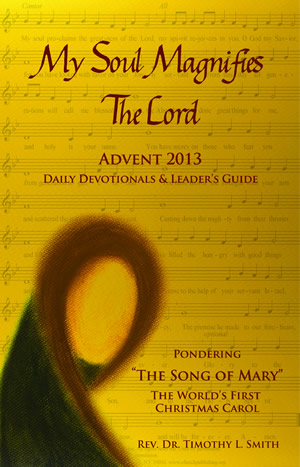
Luke 1:46-47
As Gabriel’s staggering news sank in, young pregnant Mary left to stay for three months with Elizabeth, an older relative (Luke 1:56). Both women were pregnant for the first time. Elizabeth would be coming to full term with John the Baptist by the end of Mary’s visit, and Mary would be into her second trimester.
These days away from peering eyes in Nazareth afforded Mary time to meditate on Scripture, sort out her life, and get used to being pregnant. Mary knew that life would never be same for her when she returned home with tummy swelling.
Mary was a reflective person who pondered the things happening to her and what they would mean, not just for her, but for the world. While staying with Elizabeth she composed her Song, probably in Hebrew, which was later translated into Greek by Luke. Mary’s poetry flowed from deep within her, as from her “soul” and “spirit” her praise magnifies the Lord.
As she sang her Song she carefully picked her way through key themes of the Hebrew prophets foreshadowing her Son’s life and ministry. It is remarkable how Jesus will speak in similar cadences and act out the themes His mother sings. For example, Mary’s Song declares how in God’s Kingdom the poor and humble will be lifted up. So Jesus will sit at table with publicans, prostitutes, and outcasts, declaring how the world will be put right.
Note in the verbs of Mary’s Song how she employs what Bible scholars call the “prophetic perfect”. She speaks of future events in the past tense. Because God promises it, you can count it as good as done and accomplished. So Mary prophesies in the past tense: “He has scattered the proud…He has brought down the powerful… He has filled the hungry with good things.” The “prophetic perfect” assurance of God’s promise is frequent in the Old Testament prophets, e.g. Isaiah 9 and 53.
Let’s take a few moments to ponder the four parts of Mary’s Song, paying attention to what we feel stirring within as we read.
PART ONE: MARY PRAISES GOD FOR WHAT HE HAS DONE FOR HER (Luke 1:46a-49)
My soul magnifies the Lord, and my spirit rejoices in God my Saviour, for he has looked with favour on the lowliness of his servant. Surely, from now on all generations will call me blessed; for the Mighty One has done great things for me, and holy is his name.
PART TWO: MARY PRAISES GOD FOR WHAT HE DOES FROM GENERATION TO GENERATION (Luke 1:50-51a)
His mercy is for those who fear him from generation to generation.
PART THREE: MARY PRAISES GOD FOR BRINGING DOWN THE ARROGANT PROUD AND LIFTING UP THE LOWLY (Luke 1:51b-53)
He has shown strength with his arm: he has scattered the proud in the thoughts of their hearts. He has brought down the powerful from their thrones, and lifted up the lowly; he has filled the hungry with good things, and sent the rich away empty.
PART FOUR: MARY PRAISES GOD FOR HIS FAITHFULNESS TO HIS PROMISES (Luke 1:54-55)
He has helped his servant Israel, in remembrance of his mercy, according to the promise he made to our ancestors, to Abraham and to his descendants for ever.”
In 1933, Dietrich Bonhoeffer, the pastor and theologian executed by the Nazis in 1945, spoke these words about Mary’s song:
The song of Mary is the oldest Advent hymn. It is at once the most passionate, the wildest, one might even say the most revolutionary Advent hymn ever sung. This is not the gentle, tender, dreamy Mary whom we sometimes see in paintings; this is the passionate, surrendered, proud, enthusiastic Mary who speaks out here. This song has none of the sweet, nostalgic, or even playful tones of some of our Christmas carols. It is instead a hard, strong, inexorable song about collapsing thrones and humbled lords of this world, about the power of God and the powerlessness of humankind.
PONDERING
- What are your thoughts about Bonhoeffer’s interpretation of Mary’s Song?
- Is there anything that surprises or challenges you in Mary’s Song? If so, what is it?



